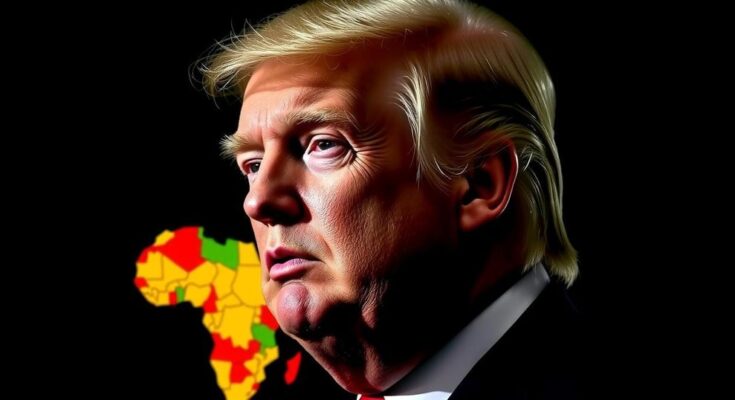The article outlines the potential implications of Donald Trump’s presidency for Africa, emphasizing his transactional approach which departs from traditional diplomatic practices. It discusses declining peacekeeping efforts, the resurgence of autocratic governance, and the increased risk of conflict as a result of shifting alliances and power dynamics within the region. The ongoing crises in Sudan and Ethiopia are highlighted, showcasing the challenges that lie ahead for U.S.-Africa relations under Trump.
The unpredictable nature of President-elect Donald Trump poses both challenges and opportunities for Africa. His transactional approach to diplomacy contradicts the established norms of patient, principle-based negotiations for peace. Under his administration, the shift from multilateral peacekeeping efforts initiated by the Obama administration to direct negotiations favoring individual leaders has left many African nations grappling with instability and conflicts. Previously, the Obama administration collaborated with the African Union to enhance funding for peacekeeping missions within UN structures, establishing a solid framework for conflict resolution and collaboration. However, following Trump’s previous terms, there has been a marked decline in new peacekeeping initiatives, with existing missions being de-authorized or diminished. This trend persisted during Biden’s presidency as well, signaling a broader retreat from multilateral diplomacy. Trump’s direct dealings with African and Middle Eastern leaders reveal his preference for immediate results, even if they come at the expense of established diplomatic principles. His administration’s dealings regarding the Grand Ethiopian Renaissance Dam and support for Morocco in Western Sahara illustrate a favor for autocratic leaders willing to strike pragmatic agreements. This “illiberal peace” approach contrasts sharply with traditional frameworks aimed at fostering democracy, justice, and long-term stability. Recent events in Sudan and Ethiopia underscore the volatility in Africa, exacerbated by regional rivalries among powerful states such as Egypt, the UAE, and Saudi Arabia, complicating prospects for peace. Trump’s past decisions indicated little regard for military involvement in African conflicts unless there was direct American interest at stake. As Trump’s second term approaches, it remains uncertain how he will navigate the intricate web of alliances and conflicts in Africa.
The complexities of African geopolitics have been long influenced by global powers, particularly the United States. Historically, U.S. foreign policy towards the continent has oscillated between principled diplomacy advocating for democratic values and a more transactional engagement that prioritizes immediate political gains. Under previous administrations, significant efforts were made to address peace and security challenges through collaboration with organizations like the African Union. However, Trump’s administration represented a pivot towards personalized diplomacy, favoring direct engagements based on transactional, rather than normative, relationships. This article examines the potential implications of Trump’s foreign policy for Africa as he prepares for another presidential term, highlighting concerns about rising conflicts and the implications of U.S. military presence in the region.
In conclusion, Donald Trump’s impending return to the presidency presents a dual-edged sword for Africa, balancing potential openings for direct negotiations against the risks of instability arising from a lack of principled diplomacy. The shift from multilateral peacekeeping to bilateral deals with individual leaders could further entrench autocratic governance and ignite further conflicts, particularly in countries like Sudan and Ethiopia. Without a measured approach that prioritizes long-term stability and respect for democratic norms, the region may endure greater volatility during Trump’s administration.
Original Source: www.bbc.com




